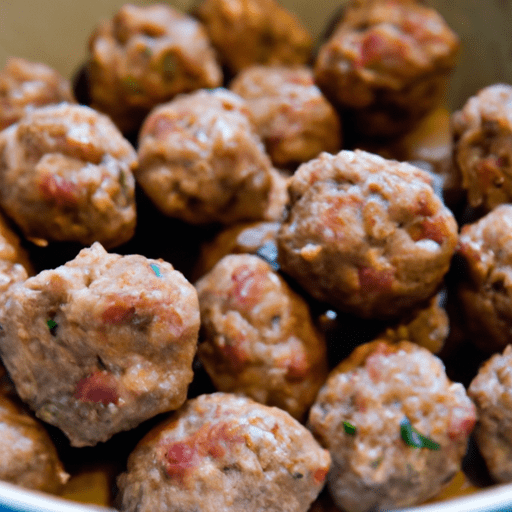The Versatile Turkey Meatball: A Delicious and Nutritious Addition to Your Recipes
When it comes to meatballs, turkey might not be the first protein that comes to mind. However, turkey meatballs are a versatile and flavorful alternative to the traditional beef or pork options. In this blog post, we will explore the taste, common uses, nutritional value, and interesting facts about turkey meatballs.
Taste and Texture
Turkey meatballs have a unique taste compared to their counterparts. They are lean and mildly gamey, allowing them to absorb flavors from complementary ingredients. When seasoned well and cooked to perfection, these meatballs have a moist and tender texture, making them a favorite among those seeking a healthier alternative to classic meatballs.
Common Uses in Cooking
The versatility of turkey meatballs makes them suitable for various preparations. Here are some popular ways to enjoy them:
Spaghetti and Meatballs: A classic combination loved by many. Turkey meatballs bring a lighter touch to this comforting dish without compromising on flavor.
Meatball Subs: Slathered with marinara sauce and topped with melted cheese, turkey meatballs add a twist to the traditional meatball sub. Serve it on a crusty roll for a satisfying lunch or dinner.
Asian-inspired Dishes: Turkey meatballs can be infused with Asian flavors such as ginger, garlic, and soy sauce. They work exceptionally well in a steaming bowl of Asian-inspired soup, like a comforting bowl of turkey meatball ramen.
Appetizers: Bite-sized turkey meatballs make fantastic appetizers for parties. Skewer them with toothpicks and serve with a tangy dipping sauce for a crowd-pleasing starter.
Nutritional Value
Turkey meatballs are not only delicious but also offer several nutritional benefits. Here are some reasons why you should consider incorporating them into your diet:
Lean Protein: Turkey is a lean meat that provides a good source of protein without the excess fat. This makes turkey meatballs an excellent option for those aiming to reduce their saturated fat intake.
Vitamins and Minerals: Turkey meatballs contain essential vitamins and minerals like iron, zinc, and B vitamins. These nutrients contribute to energy production, immune function, and overall well-being.
Low Calorie: Compared to traditional meatballs, turkey meatballs are generally lower in calories. This makes them a suitable choice for those watching their calorie intake or maintaining a balanced diet.
Interesting Facts and History
Turkey meatballs have a rich history and have been enjoyed by various cultures throughout the world:
Ancient Rome: The concept of meatballs originated in ancient Rome, where they were known as “isicia omentata.” These were made with a mix of ground meat, bread, wine-soaked nuts, and pepper, and were often served with a rich sauce.
Middle Eastern Influence: Turkish-style meatballs known as “köfte” have been popular in the Middle East for centuries. Made with ground meat, herbs, spices, and breadcrumbs, these meatballs are commonly grilled or roasted.
Global Variations: Different countries have their own unique take on turkey meatballs. For example, Italian turkey meatballs often incorporate garlic, herbs, and Parmesan cheese, while Swedish meatballs are traditionally made with a combination of ground meats, breadcrumbs, and spices.
It’s fascinating to see how turkey meatballs have evolved and adapted across cultures, adding their own flair to this beloved dish. With their rich history and delicious flavors, turkey meatballs continue to delight taste buds around the world.
In conclusion, turkey meatballs are a versatile and healthier alternative to traditional meatballs. Whether you enjoy them in a classic spaghetti dish or get creative with Asian-inspired flavors, their unique taste and nutritional benefits make them a must-try. So, next time you’re in the mood for meatballs, give turkey meatballs a chance to win you over with their deliciousness!
Origin: Turkey meatballs are believed to have originated in the Middle East, specifically in the Ottoman Empire, which covered present-day Turkey. Meatballs were a popular dish in the region due to their easy preparations and versatility.
Common Uses: Turkey meatballs are commonly used in a variety of cuisines and dishes around the world. They are often served as a main course, as a filling in sandwiches or wraps, or as an appetizer. They can be baked, fried, or simmered in sauces, such as tomato or cream-based sauces, to enhance their flavor.
Nutritional Benefits: Turkey meatballs offer several nutritional benefits. They are a good source of lean protein, which is essential for building and repairing body tissues. They are also lower in fat compared to meatballs made with higher-fat meats. Additionally, turkey meatballs are rich in vitamins and minerals, including niacin, vitamin B6, selenium, and zinc.
Unique Properties: Turkey meatballs have a few unique properties that make them distinct from other meatball varieties. Turkey meat has a milder flavor compared to beef or pork, allowing the flavors of the seasonings and herbs to shine through. Turkey meatballs also tend to have a lighter and less dense texture than those made from other meats. Because turkey is leaner, it is important to handle the meat mixture gently and not overcook the meatballs to avoid drying them out.
Historical Significance: While specific historical significance related solely to turkey meatballs is not widely known, meatballs, in general, have a long history in many cultures. They are believed to have been consumed since ancient times. In medieval Arab and Persian cookery, meatballs were known as kofta or kefta. Over time, different regions and cultures developed their own variations of meatballs, using different meats, seasonings, and cooking methods. Turkey meatballs became popular in the Western world with the rise of turkey as a meat alternative to other red meats.




Use the share button below if you liked it.
It makes me smile, when I see it.